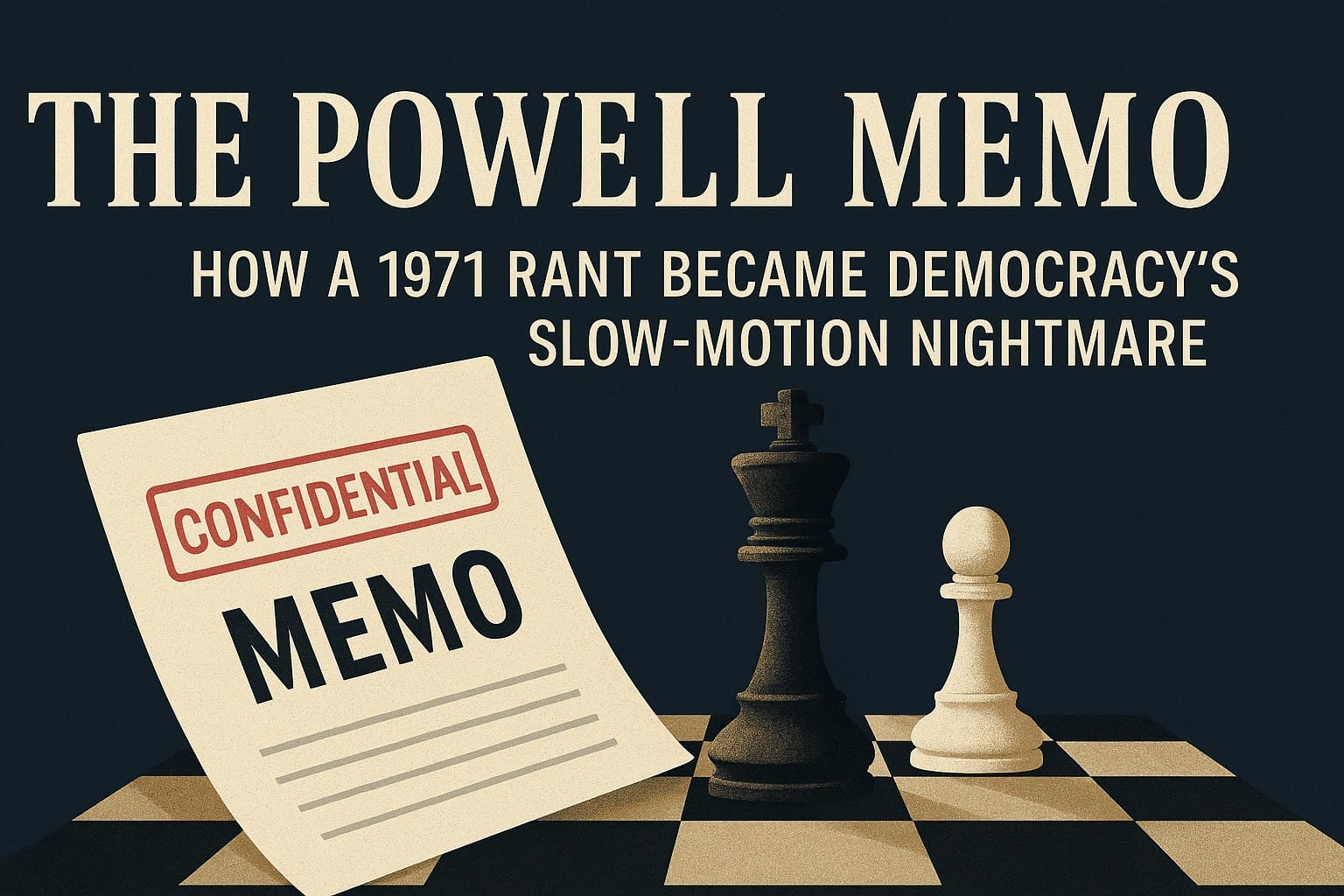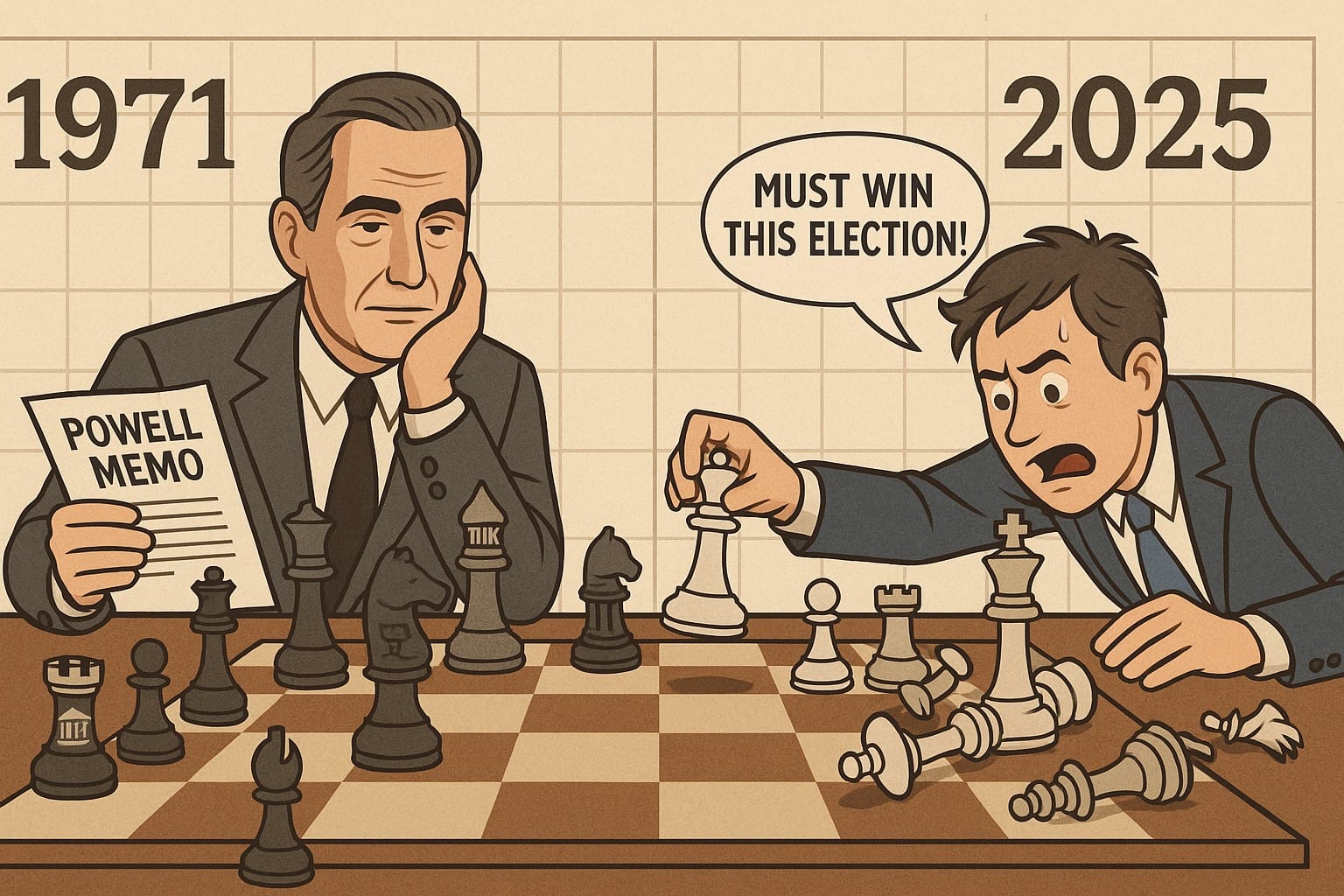Or: What happens when one side plays chess and the other plays checkers
Amid American political chaos, decisive shifts don’t begin with riots, elections, or even presidents. They begin with paperwork. In 1971, corporate lawyer Lewis Powell wrote a confidential memo that provided the business elite with a strategy for taking politics seriously, building institutions deliberately, and pursuing power over the long term.
Fifty years later, this document has evolved into a vast and resilient infrastructure threatening to transform not only policy but democracy itself. What began as a critique of Ralph Nader and campus radicals has developed into Project 2025—a comprehensive plan for governing America through institutions designed to outlast voters, elections, and the complex feedback mechanisms of democratic life.

The Powell Memo
It's 1971. Nixon is president, bell-bottoms are trendy, and a Virginia corporate lawyer named Lewis Powell is having an epic meltdown about hippies and consumer advocates ruining capitalism.
So naturally, he writes a memo about it.
Not just any memo, but one that makes you wonder if chaos theory was invented by political scientists who foresaw the future. Because his 6,000-word corporate lawyer manifesto would, over the next five decades, reshape American democracy in ways that would make Niccolò Machiavelli salute.
Lewis Powell's "Attack on American Free Enterprise System" reads like what would happen if your most conservative uncle became an expert at writing policy papers after binge-watching a hundred episodes of "Firing Line" with William F. Buckley. Powell was absolutely convinced American business was under siege from a sinister coalition of college students, intellectuals, Ralph Nader (before he tanked his legacy), and anyone who thought maybe corporations shouldn't be allowed to treat environmental regulations like cutlery at a hotdog eating contest.
From Corporate Grievance to Institutional Blueprint
The memo opens with Powell portraying American enterprise as some tragic hero in a Shakespearean drama, beset on all sides by ungrateful academics who had the temerity to suggest that maybe dumping chemicals into rivers wasn't patriotic. He was particularly exercised about campus radicals who seemed to think that questioning corporate power was more important than quarterly earnings reports.
His solution? Businesses needed to stop being polite little lambs bleating quietly in the corner and start organizing like they understood that politics wasn't a spectator sport.
Powell laid out a battle plan that was part McKinsey consulting deck, part revolutionary manifesto. Fund think tanks! Infiltrate universities! Build media empires! Create legal organizations! Train future bureaucrats! Do everything that successful political movements do, except with better suits, more spreadsheets, and a significantly higher likelihood of having catered meetings with proper salad fork etiquette.
The memo was meant to be confidential, shared only with the U.S. Chamber of Commerce, like a corporate state secret. It remained hidden until 1972, coinciding with Powell’s Supreme Court confirmation. This timing raises questions about whether someone in the Nixon administration appreciated the dramatic irony, akin to Sophocles.

The Long-Term Strategy of Conservative Institution-Building
Here's where it gets fascinating (and mildly terrifying): They actually listened.
The Heritage Foundation emerged in 1973, like Powell's memo had been a political summoning spell. The American Enterprise Institute got a massive funding boost. The Federalist Society arrived in 1982, dedicated to the revolutionary idea that conservative lawyers should organize like liberal lawyers had been doing for decades. A constellation of think tanks, legal organizations, media outlets, and training programs sprouted up like intellectual dandelions, all following Powell's basic blueprint of "stop complaining about the game and start building better players."
Here's the truly remarkable part: They didn't just build institutions; they built ones designed to outlast election cycles, economic downturns, and cultural shifts. The Federalist Society didn't want to influence one Supreme Court appointment; they wanted to create a pipeline to influence every appointment for the next fifty years—which, spoiler alert, they pretty much did. Heritage didn't want to write policy papers; they wanted to create a permanent alternative universe where conservative white papers would still be cranking out talking points when everyone alive in 1971 was compost.
This wasn't just political organizing. This was political investing, with the kind of long-term horizon that would make Warren Buffett weep.
Fast-forward to 2024, and you get Project 2025. Project 2025 is a 920-page manual for taking over the federal government that reads like someone fed the Powell Memo into an AI trained exclusively on organizational psychology textbooks and Tom Clancy novels. It's so comprehensively planned that it makes NASA's moon landing logistics look like a grocery list scribbled on a napkin.
Project 2025 isn't just a policy wish list. It's the culmination of five decades of institutional building, complete with:
- Operational plans for every cabinet department (because "we'll figure it out" isn't a governing strategy)
- Searchable databases of pre-vetted personnel with security clearances already in progress (because nothing says "small government" like a spreadsheet of future bureaucrats)
- Training programs have been preparing future political appointees for years
- Day-one implementation strategies assuming no time to learn where the bathroom is, let alone how to run the EPA
It's like someone turned "be prepared" into a doctoral dissertation in applied authoritarianism, then hired management consultants to create implementation workflows.
Strategic Asymmetry and the Limits of Electoral Thinking
Here's the kicker: While conservatives were building this elaborate, decades-spanning institutional machine, everyone else was playing political whack-a-mole with increasingly sophisticated moles.
The conservatives were like that friend who starts maxing out their 401(k) contributions at 22, systematically building wealth through compound interest for forty years. Meanwhile, the pro-democracy crowd was like someone who suddenly remembers they need to retire in six months and starts day-trading cryptocurrency based on TikTok advice.
Conservatives were thinking generationally—not in the "better world for our children" way, but in the brutal, practical sense of building institutions to accumulate power across decades. They created law school pipelines for the federal judiciary, media ecosystems to shape public opinion independent of traditional journalism and think tanks to generate detailed governing agendas years before elections even happened.
The other side was thinking in election cycles. Two years if they were feeling pessimistic, four if they were really stretching their strategic imagination. Every campaign was treated like the Most Important Election Ever™, with success measured entirely by whether they could mobilize enough voters to win right now, with whatever tools were available.
Consider the judiciary. While liberal legal organizations focused on winning individual cases, the Federalist Society was systematically identifying promising law students, providing internships, grooming them for appellate courts, and creating a deep bench so Republican presidents could pick Supreme Court justices like breakfast cereal—quickly, confidently, and with full knowledge of exactly what they're getting.
Or take think tanks. Liberal policy organizations spent decades drafting papers to respond to conservative initiatives, while conservative think tanks drafted the papers that became the initiatives. It's the intellectual equivalent of playing defence for fifty years while the other team scores points by simply deciding the game you're going to play.

Parallel Power Structures and Erosion of Democratic Feedback Loops
This brings us to the uncomfortable truth that Powell probably didn't anticipate: In some skillful hands, the institutional framework he advocated for defending democracy has become a sophisticated tool for potentially undermining it.
Powell wanted businesses to participate more effectively in democratic politics. What emerged was a parallel governing apparatus that could operate independently of traditional democratic feedback loops. When your think tanks, media outlets, legal organizations, and personnel pipelines are all coordinated by the same network of donors, you've constructed an alternative government waiting for the opportunity to become the actual government.
The current threats to democracy—polarization worse than the Civil War, institutional capture, information warfare, and weaponized legal systems—aren't necessarily caused by the Powell Memo, but they're certainly enabled by the institutional ecosystem it helped spawn.
It's like Powell wrote a recipe for forging the perfect chef's knife, and fifty years later, someone's using that knife for precise surgery on democracy's circulatory system.
Compounding Effects and Escalation of Institutional Power
The maddening part is the feedback loop. The more successful the long-term institutional strategy, the more urgent everything feels for the other side. This makes them focus on short-term fixes instead of building competing institutions.
It's political compound interest. Instead of money, it's power, and instead of retirement planning, the endpoint might be replacing democratic governance with a democracy-like facade functioning like an oligarchy with better marketing.
Every conservative victory that capitalizes on institutional advantages creates significant challenges for opponents, making it hard to envision anything beyond the next election. It's like building a house while someone tears down the foundation. It's hard to focus on long-term construction when the structure is falling apart.
The Legacy of Powell’s Institutional Vision
In 2025, we're living with the institutional legacy of a 1971 memo written by a guy upset that college students were being mean to DuPont executives. Project 2025 represents the mature flowering of Powell's vision: a comprehensive governing apparatus built over decades, tested through multiple election cycles, and refined through victory and defeat.
Meanwhile, the pro-democracy forces’ institutional response looks like it was designed by people who just discovered that politics might be essential and are frantically trying to build organizations while the election is already happening.

Unanswered Questions of Democratic Resilience
What happens when a strategy designed to defend democratic capitalism becomes so sophisticated that it threatens the democratic part? How do you counter institutional power that's had a fifty-year head start? And most importantly, is it even possible to build democratically oriented institutions as effectively as the Powell Memo built conservative ones?
The answers aren't obvious, but the questions are desperately urgent. If there's one thing the Powell Memo teaches us, it's that in politics, the side that thinks furthest ahead usually gets to write the rules everyone else follows.
The ultimate irony is almost too perfect for fiction. A memo written to preserve American democratic capitalism may have inadvertently helped create the conditions for its demise. Powell wanted to defend the system by making it more responsive to business interests. He probably didn't anticipate the tools he advocated might be used to reconstruct the system entirely.
Sometimes the revolution doesn't announce itself with manifestos and barricades. Sometimes it comes with think tanks and personnel databases, policy papers and judicial pipelines. Sometimes the most dangerous transformation happens so gradually, so institutionally, that by the time you notice, the new system is already built and operational.
Epilogue: Powell’s Yelp Review from the Afterlife
Welcome to 2025, where a fifty-year-old corporate lawyer's tantrum is still reshaping American politics. Somewhere in the afterlife, Lewis Powell is probably scrolling through Project 2025 like it's a five-star Yelp review of his life's work, nodding approvingly at how thoroughly his successors understood the assignment.
I don't sell memberships or anything, but if you want to buy me a beer, I won't refuse.


